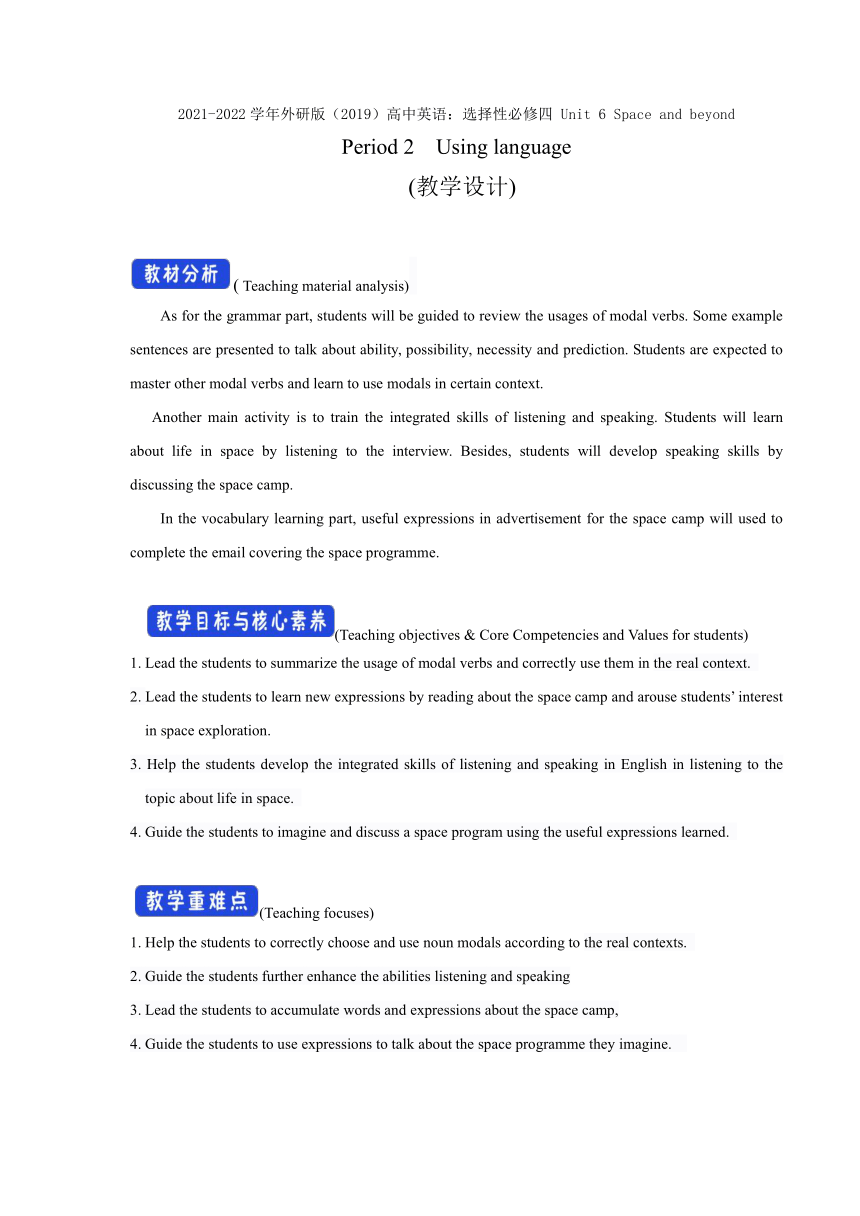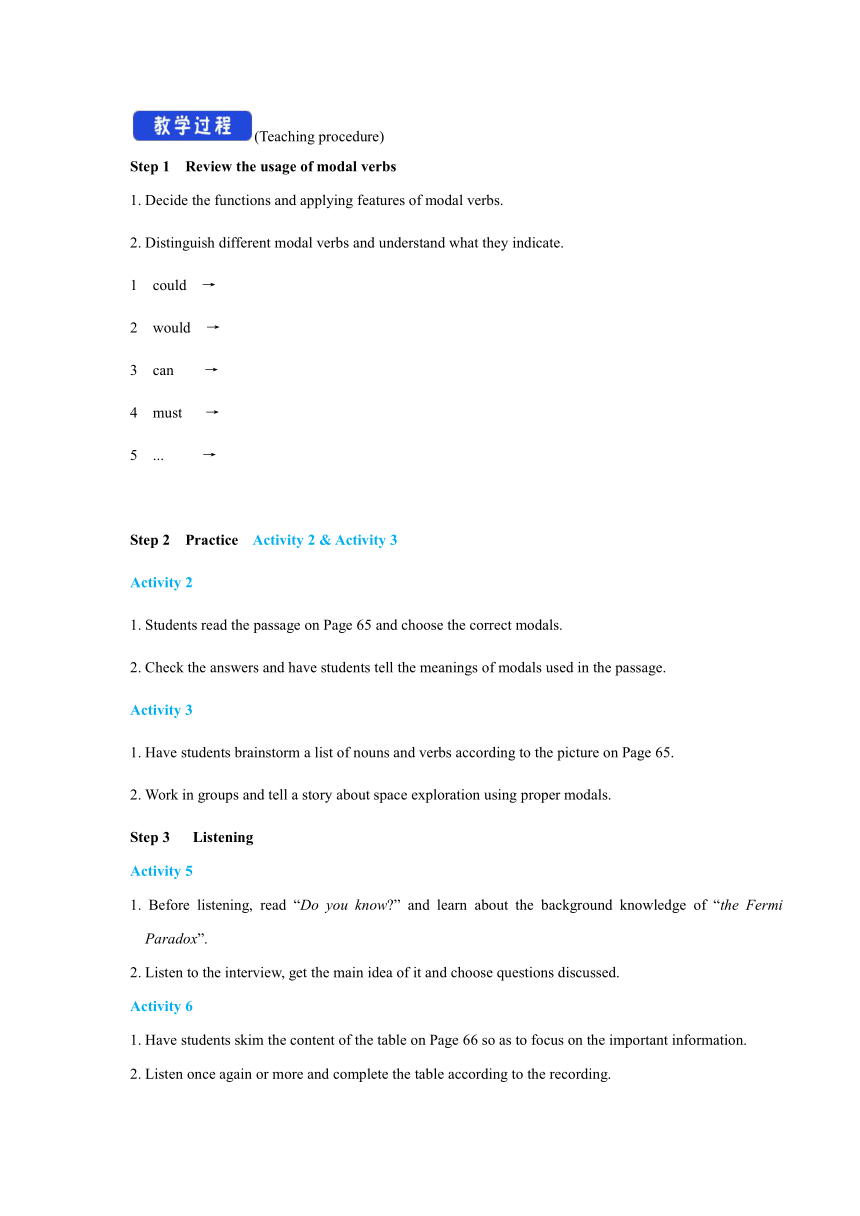2021-2022学年外研版(2019)高中英语:选择性必修四 Unit 6 Space and beyond Peroid 2 Using language 教案
文档属性
| 名称 | 2021-2022学年外研版(2019)高中英语:选择性必修四 Unit 6 Space and beyond Peroid 2 Using language 教案 |

|
|
| 格式 | docx | ||
| 文件大小 | 45.6KB | ||
| 资源类型 | 教案 | ||
| 版本资源 | 外研版(2019) | ||
| 科目 | 英语 | ||
| 更新时间 | 2021-08-16 00:00:00 | ||
图片预览


文档简介
2021-2022学年外研版(2019)高中英语:选择性必修四 Unit 6 Space and beyond
Period 2 Using language
(教学设计)
(?Teaching?material?analysis)
As for the grammar part, students will be guided to review the usages of modal verbs. Some example sentences are presented to talk about ability, possibility, necessity and prediction. Students are expected to master other modal verbs and learn to use modals in certain context.
Another main activity is to train?the?integrated?skills?of?listening and speaking. Students will learn about life in space by listening to the interview. Besides, students will develop speaking skills by discussing the space camp.
In the vocabulary learning part, useful expressions in advertisement for the space camp will used to complete the email covering the space programme.
(Teaching objectives & Core Competencies and Values?for students)
1. Lead the students to summarize the usage of modal verbs and correctly use them in the real context.
2. Lead the students to learn new expressions by reading about the space camp and arouse students’ interest in space exploration.
3. Help the students develop the integrated skills of listening and speaking in English in listening to the topic about life in space.
4. Guide the students to imagine and discuss a space program using the useful expressions learned.
(Teaching focuses)
1. Help the students to correctly choose and use noun modals according to the real contexts.
2. Guide the students further enhance the abilities listening and speaking
3. Lead the students to accumulate words and expressions about the space camp,
4. Guide the students to use expressions to talk about the space programme they imagine.
(Teaching?procedure)
Step 1 Review the usage of modal verbs
1. Decide the functions and applying features of modal verbs.
2. Distinguish different modal verbs and understand what they indicate.
1 could →
2 would →
3 can →
4 must →
5 ... →
Step 2 Practice Activity 2 & Activity 3
Activity 2
1. Students read the passage on Page 65 and choose the correct modals.
2. Check the answers and have students tell the meanings of modals used in the passage.
Activity 3
1. Have students brainstorm a list of nouns and verbs according to the picture on Page 65.
2. Work in groups and tell a story about space exploration using proper modals.
Step 3 Listening
Activity 5
1. Before listening, read “Do you know?” and learn about the background knowledge of “the Fermi Paradox”.
2. Listen to the interview, get the main idea of it and choose questions discussed.
Activity 6
1. Have students skim the content of the table on Page 66 so as to focus on the important information.
2. Listen once again or more and complete the table according to the recording.
Answers
Q1
Sophie: Three must be millions of planets like ours, and some could have life 1________.
Eric: You would think it likely that 2 ________. But that’s 3 __________ the Fermi Paradox.
Q2
Sophie: Life on other planets won’t look like us because 4 ____________.
Eric: Because evolution 5 ________, like on other planets is likely to look like us.
Q3
Eric: We cannot 6 _________, which means it would take more than a lifetime to reach planets where there might be life.
Sophie: Maybe we don’t need to travel in straight lines. Perhaps we will be able to 7 _______ to make contact with life on other planets.
Step 4 Posting listening
Activity 7
Check the answers and know about how to express opinions and hopes.
A. I think there definitely is.
B. Since..., it isn’t reasonable to...
C. There’s evidence that...
D. It would be wonderful if ...
E. The fact that ... means ...
F. Let’s hope that ...
Expressing opinions:
Expressing hopes:
Step 5 Focus on vocabulary about the space camp
Activity 8
1. Read the passage on Page 66 and know more about the space camp. Then answer the questions given.
Activity 9 & Activity 10
2. Read the advertisement for the space camp and learn the works and expressions in bold.
◎ observatory
◎ capsule
◎ lunar eclipse
◎ spacewalk
◎ launch a model rocket
◎ zero gravity
◎ put on a spacesuit
◎ space sick
3. Complete the email with the correct form of the words and expressions in Activity 9.
Step 6 Discussion
Activity 10
1. Imagine going to apply for the program and brainstorm a list words and phrases about the space exportation.
2. Organize the ideas for the short video.
Step 7 Language appreciation
1. So great was the distance from Earth that it would need to travel for almost six years to reach its destination.
[句式分析] 这是一个倒装句。在so/such... that...结构中,so/such...置于句首时,主句采用部分倒装, that引导的从句不倒装。
[尝试翻译] 从地球到土星的距离是如此之远,以至于它将需要航行近6年才能到达目的地。
2. No wonder so many people took to social media to bid it goodbye, saying, “Farewell, dear Cassini! We shall never forget you!”
[句式分析] 语境中 No wonder 的完整形式为 “It’s no wonder that-clause”, 意为“难怪......”,其中的从句为主语从句而且后置。...saying... 为现在分词在句子中充当伴随状语。
[尝试翻译] 难怪这么多人在社交媒体上跟它说再见,说:再见,亲爱的卡西尼!我们永远不会忘记你!
Step 8: Assignments
1. Review the useful words and expressions learned in this period.
2. Do more exercise to further master the grammar item-- modal verbs.
3. Listen to the interview on Page 66 again for more details.
Period 2 Using language
(教学设计)
(?Teaching?material?analysis)
As for the grammar part, students will be guided to review the usages of modal verbs. Some example sentences are presented to talk about ability, possibility, necessity and prediction. Students are expected to master other modal verbs and learn to use modals in certain context.
Another main activity is to train?the?integrated?skills?of?listening and speaking. Students will learn about life in space by listening to the interview. Besides, students will develop speaking skills by discussing the space camp.
In the vocabulary learning part, useful expressions in advertisement for the space camp will used to complete the email covering the space programme.
(Teaching objectives & Core Competencies and Values?for students)
1. Lead the students to summarize the usage of modal verbs and correctly use them in the real context.
2. Lead the students to learn new expressions by reading about the space camp and arouse students’ interest in space exploration.
3. Help the students develop the integrated skills of listening and speaking in English in listening to the topic about life in space.
4. Guide the students to imagine and discuss a space program using the useful expressions learned.
(Teaching focuses)
1. Help the students to correctly choose and use noun modals according to the real contexts.
2. Guide the students further enhance the abilities listening and speaking
3. Lead the students to accumulate words and expressions about the space camp,
4. Guide the students to use expressions to talk about the space programme they imagine.
(Teaching?procedure)
Step 1 Review the usage of modal verbs
1. Decide the functions and applying features of modal verbs.
2. Distinguish different modal verbs and understand what they indicate.
1 could →
2 would →
3 can →
4 must →
5 ... →
Step 2 Practice Activity 2 & Activity 3
Activity 2
1. Students read the passage on Page 65 and choose the correct modals.
2. Check the answers and have students tell the meanings of modals used in the passage.
Activity 3
1. Have students brainstorm a list of nouns and verbs according to the picture on Page 65.
2. Work in groups and tell a story about space exploration using proper modals.
Step 3 Listening
Activity 5
1. Before listening, read “Do you know?” and learn about the background knowledge of “the Fermi Paradox”.
2. Listen to the interview, get the main idea of it and choose questions discussed.
Activity 6
1. Have students skim the content of the table on Page 66 so as to focus on the important information.
2. Listen once again or more and complete the table according to the recording.
Answers
Q1
Sophie: Three must be millions of planets like ours, and some could have life 1________.
Eric: You would think it likely that 2 ________. But that’s 3 __________ the Fermi Paradox.
Q2
Sophie: Life on other planets won’t look like us because 4 ____________.
Eric: Because evolution 5 ________, like on other planets is likely to look like us.
Q3
Eric: We cannot 6 _________, which means it would take more than a lifetime to reach planets where there might be life.
Sophie: Maybe we don’t need to travel in straight lines. Perhaps we will be able to 7 _______ to make contact with life on other planets.
Step 4 Posting listening
Activity 7
Check the answers and know about how to express opinions and hopes.
A. I think there definitely is.
B. Since..., it isn’t reasonable to...
C. There’s evidence that...
D. It would be wonderful if ...
E. The fact that ... means ...
F. Let’s hope that ...
Expressing opinions:
Expressing hopes:
Step 5 Focus on vocabulary about the space camp
Activity 8
1. Read the passage on Page 66 and know more about the space camp. Then answer the questions given.
Activity 9 & Activity 10
2. Read the advertisement for the space camp and learn the works and expressions in bold.
◎ observatory
◎ capsule
◎ lunar eclipse
◎ spacewalk
◎ launch a model rocket
◎ zero gravity
◎ put on a spacesuit
◎ space sick
3. Complete the email with the correct form of the words and expressions in Activity 9.
Step 6 Discussion
Activity 10
1. Imagine going to apply for the program and brainstorm a list words and phrases about the space exportation.
2. Organize the ideas for the short video.
Step 7 Language appreciation
1. So great was the distance from Earth that it would need to travel for almost six years to reach its destination.
[句式分析] 这是一个倒装句。在so/such... that...结构中,so/such...置于句首时,主句采用部分倒装, that引导的从句不倒装。
[尝试翻译] 从地球到土星的距离是如此之远,以至于它将需要航行近6年才能到达目的地。
2. No wonder so many people took to social media to bid it goodbye, saying, “Farewell, dear Cassini! We shall never forget you!”
[句式分析] 语境中 No wonder 的完整形式为 “It’s no wonder that-clause”, 意为“难怪......”,其中的从句为主语从句而且后置。...saying... 为现在分词在句子中充当伴随状语。
[尝试翻译] 难怪这么多人在社交媒体上跟它说再见,说:再见,亲爱的卡西尼!我们永远不会忘记你!
Step 8: Assignments
1. Review the useful words and expressions learned in this period.
2. Do more exercise to further master the grammar item-- modal verbs.
3. Listen to the interview on Page 66 again for more details.
